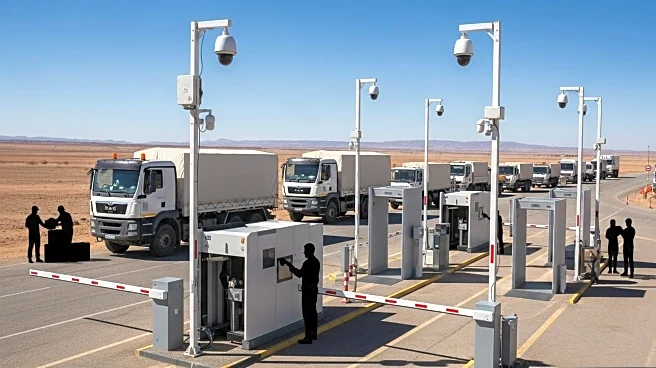What is the story about?
What's Happening?
Israeli Defense Forces (IDF), along with other agencies such as COGAT, the Shin Bet, and border customs, have intercepted attempts to smuggle solar panels, electric cables, and cell phones into Gaza through humanitarian aid trucks. These incidents occurred near the Kissufim border crossing, where four different trucks were found carrying the smuggled items. The smuggling attempts come amid ongoing conflict between Israel and Hamas, highlighting the challenges faced in ensuring that humanitarian aid is not misused for illicit purposes.
Why It's Important?
The interception of smuggled goods in humanitarian aid trucks underscores the complexities of delivering aid in conflict zones. It raises concerns about the security and integrity of aid deliveries, which are crucial for civilian populations in Gaza. The involvement of multiple agencies in preventing smuggling reflects the heightened security measures necessary to maintain peace and order. This situation impacts international relations and humanitarian efforts, as it may influence how aid is monitored and distributed in conflict areas, potentially affecting the speed and efficiency of aid delivery.
What's Next?
The ongoing conflict between Israel and Hamas suggests that security measures at border crossings will continue to be stringent. Agencies involved in border security may enhance their protocols to prevent further smuggling attempts. This could lead to increased scrutiny of aid deliveries, potentially slowing down the process but ensuring that aid reaches its intended recipients. International stakeholders, including humanitarian organizations, may need to collaborate more closely with security agencies to balance aid delivery with security concerns.
Beyond the Headlines
The smuggling attempts highlight ethical and legal challenges in humanitarian aid delivery. Ensuring that aid is not diverted for illicit purposes is crucial for maintaining trust in international aid efforts. This situation may prompt discussions on the ethical responsibilities of aid organizations and the legal frameworks governing aid delivery in conflict zones. Long-term, it could lead to policy changes aimed at improving transparency and accountability in aid distribution.















